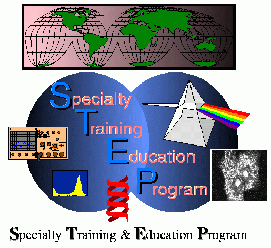


[Introduction to STEP]
[Specialty Areas]
[STEP Committee Members]
[Search for Keyword]
Testicular and Sperm Cell Studies
SDSU Cytometry Laboratory South Dakota State University, ASC 136 Brookings, South Dakota 57007Laboratory Profile
Director: Don Evenson, Ph.D.
1. Facilities available: 1000 square foot working laboratory plus animal rooms (mice/rats), instrument room, tissue culture facility.
2. Instrumentation:
Flow cytometry: Cytofluorograf with 100 mW argon and Omnichrome air-cooled UV laser, He-Ne; ICP22A mercury arc flow cytometer both interfaced to Ortho 2151 data handler and Acqcyte (Phoenix Flow Systems) acquisition board in 486/66 PC. Also interfaced to 386/33 PC for off-line analysis. Expecting FACSort flow cytometer soon.
Image analysis: High resolution CCD camera on Nikon Optiphot microscope with mercury arc light source and differential interference contrast optics interfaced to computer with frame grabber board. Sperm morphology and fluorescence distribution software.
Computers & analytical: Flow cytometer data analysis systems are based on Ortho data handling system and/or IBM PC-based. Software includes Phoenix Flow (Multi 2D, Multi Cycle, Listview), PC SAS, Quattro Pro, Sigma Plot, Word Perfect, REF 11 containing literature citations.
3. Specialization Areas: Our laboratory has extensive experience measuring by flow cytometry various features of sperm cells that relate to toxicology and fertility with a special emphasis on sperm chromatin structure. Chromatin structure has been studied by measuring the susceptibility to DNA denaturation in situ, accessibility of nuclear DNA to fluorochromes, extent of DNA strand breaks and quantitation of free sulfhydryl groups in sperm protamines. Flow cytometry protocols have also been developed for simultaneous measurements of sperm cell membrane integrity, acrosomal integrity, mitochondrial function, and sperm concentration. Flow cytometry is also used to determine the ratios of testicular cells types present. Image analysis is used to determine cell morphometry as well as localization and quantitation of fluorochrome-tagged probes on sperm, testicular cell membranes, or internal components.
4. Special Opportunities: Isolation, preparation, handling of mouse or rat reproductive tract cells for flow cytometry or image analysis measurements. Hands on training for measurement of parameters listed above by flow cytometry and/or image analysis. Processing of data for graphic presentations. Preparation and measurements on frozen bull semen for fertility analysis.
5. Special Courses Offered: None at this time.
6. Graduate Programs: None at this time.
7. Local Accommodations: SDSU campus dormitories (summer only) $12.00/night; inexpensive local hotels $24/night. University cafeteria available.
8. Transportation: Local airport with 3 daily flights from Minneapolis to Brookings Airport (BKX). Multiple carrier service from Sioux Falls (FSD), 55 miles south of Brookings.
9. Cost of Internship: A base rate of $500.00 per week will include about 10 hours of flow cytometry instrument time and some image analysis time. Rates may vary depending on the cost of various reagents used, number of participants and whether student is from a disadvantaged country. Summer internships preferable.
10. Communication:
Don Evenson, Ph.D. Professor of Chemistry Olson Biochemistry Labs, ASC 136 North Campus Drive South Dakota State University Brookings, SD 57007 Phone: (605) 688-5474 FAX: (605) 688-6295
